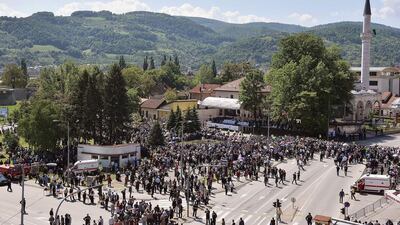The war that engulfed Bosnia and Herzegovina as part of the wider Balkan conflict in the 1990s remains a source of pain and anger, but the future is finally looking brighter. More than 600 mosques were destroyed in Bosnia as part of a campaign of ethnic cleansing conducted by Serbs that also targeted Roman Catholic Croats and other non-Serbs.
One area shared by Croats and Bosnian Muslims, Banja Luka, ended up inside the boundaries of an ethnic Serbian zone within Bosnia as part of the Dayton peace accords that ended the war. In a remarkable display of reconciliation that bodes well for the future, one of Banja Luka’s mosques has been carefully rebuilt and reopened in a ceremony attended by a variety of religious leaders and politicians 23 years after it was destroyed.
The Ferhad Pasha mosque – known as Ferhadija – was considered a crown jewel of Ottoman architecture in the Balkans before it was destroyed in the war. Residents have painstakingly collected fragments of the destroyed mosque and have incorporated them into the reopened place of worship.
More than 10,000 people turned out for the reopening, including outgoing Turkish prime minister Ahmet Davutoglu, several Bosnian politicians and leaders of the Roman Catholic Church, Serb Orthodox Churches and the Jewish community. Nations and regions that have endured great trauma and bloodshed but have persevered through the tragedy can sometimes become examples of coexistence. The process is never straightforward and often takes time but humanity can learn from these experiences.
The representation of so many religions and ethnic groups at the reopening of the Ferhadija mosque is clearly a step towards reconciliation trumping nationalism. It hasn’t been easy – an attempt to lay a foundation stone for the mosque in 2001 was disturbed by a mob of ethnic Serbians and descended into violence – but the ultimate success of the project is one that other countries can learn from and emulate.

